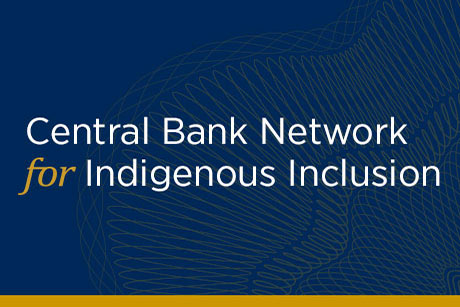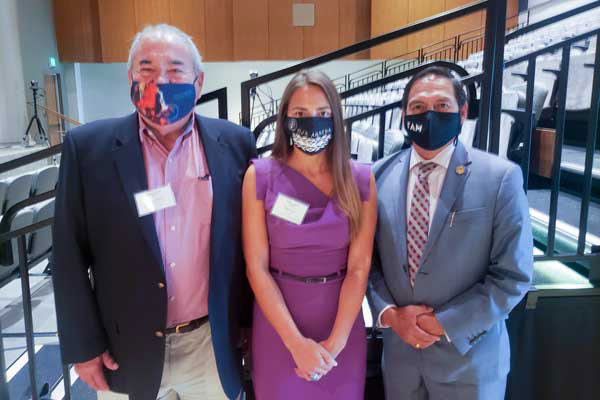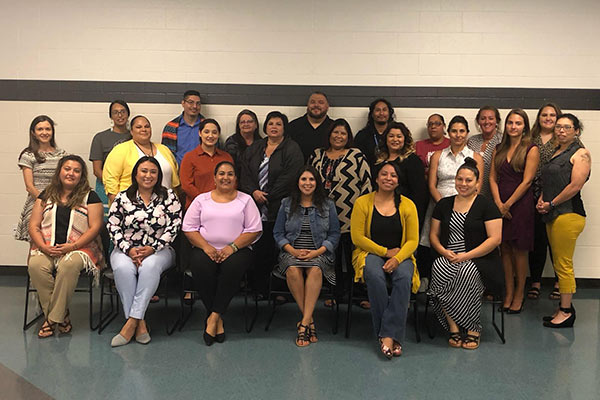The Fed Board Joins the Central Bank Network for Indigenous Inclusion
The Federal Reserve Board announced Oct. 13 that it has joined the Central Bank Network for Indigenous Inclusion, which will foster ongoing dialogue, research and education to raise awareness of economic and financial issues and opportunities for Indigenous economies.

Collaborating in the Network
- Indigenous partners
- The Federal Reserve Board of Governors
- Te Pūtea Matua (the Reserve Bank of New Zealand)
- The Bank of Canada
- The Reserve Bank of Australia
Board Participation Supporters
- The Economic Education Partnership with Indian Country at the Federal Reserve Bank of St. Louis
- The Center for Indian Country Development at the Federal Reserve Bank of Minneapolis
The Board’s participation will be supported by the Economic Education Partnership with Indian Country at the Federal Reserve Bank of St. Louis and the Center for Indian Country Development at the Federal Reserve of Minneapolis. Along with Indigenous partners, the network is a collaboration with Te Pūtea Matua (the Reserve Bank of New Zealand), the Bank of Canada, and the Reserve Bank of Australia.
“The Federal Reserve Board is pleased to join the Central Bank Network for Indigenous Inclusion and I am personally looking forward to deepening our discussions with colleagues from around the world on economic issues that matter to Indigenous communities,” Gov. Michelle W. Bowman said.
Economic Education Partnership with Indian Country

From left, Principal Chief Geoffrey Standing Bear of the Osage Nation, author Megan Cruz of the St. Louis Fed’s Economic Education department, and Principal Chief David Hill of the Muscogee Nation attend an Oct. 13, 2021, Fed Listens event in Oklahoma City sponsored by the Federal Reserve Bank of Kansas City.
The partnership with Indian Country began in 2018, after a request from Principal Chief Geoffrey Standing Bear of the Osage Nation that the St. Louis Fed provide financial education for the nation’s youth programs. Our work with the Osage is especially symbolic, as the St. Louis Fed resides on the ancestral homeland of the Osage people.
With the success of Osage programming came requests from other tribal leaders, who cite financial stress as one of the pervasive issues hindering the wellbeing of their people. With rising demand for programming, in January 2020 the St. Louis Fed established a formal program. I’m a senior economic education specialist at the St. Louis Fed and an Osage citizen, and I lead this initiative.
Since the program’s inception, the St. Louis Fed has partnered with over 15 tribal nations across the country, including the third and fourth largest, the Choctaw Nation of Oklahoma and the Muscogee Nation, respectively. The 15 tribal nations span Oklahoma to Florida, Arizona, and the Pacific Northwest. Of particular interest to our partners is the flexibility to include their Native language and culture in the Federal Reserve curriculum. In delivering this programming, we currently partner with the Federal Reserve Banks of Atlanta and Kansas City.
A Multiyear Research Project with a Tribal Nation
The St. Louis Fed’s work with other tribal nations and Native organizations incorporates financial education into a broad array of tribal programs, including for:
- Early childhood education
- Youth employment
- Housing
- Reservation schools
- Higher education
- Workforce development
- Emergency assistance
- Children and family services
- Elder programs
While data about financial behaviors in Indian Country are limited, there is some information that indicates Native Americans face higher rates of financial fragility than most other groups in the United States. For example, American Indians and Alaska Natives have a higher rate of poverty than most other minority groups, according to the Census Bureau’s American Community Survey 2019 one-year estimates.
This year, to address the financial behavior data gap, the St. Louis Fed began a multiyear research project with a tribal nation. This large-scale project will track the long-term financial behaviors and knowledge of the tribe’s citizens while using Federal Reserve financial education curricula in a culturally appropriate manner.
This work is mutually beneficial: It will provide valuable information for the tribal nation’s leadership and provide the St. Louis Fed with important insights into a population where there is an identified shortage of information.
Significant Returns for Native Communities

Educators from tribal nations in the Anadarko, Okla., area participate in personal finance workshops in July 2019.
Overall, the St. Louis Fed’s Economic Education program offers a wide range of curricula for grades K-12, which means that there are many potential opportunities within a tribal nation’s youth programs to incorporate these resources. Investing in the financial education of Native youth, many of whom lack opportunities to develop financial skills, can offer significant returns for Native communities. Not only can it benefit individual students and their families, but it can also help develop youth to be future leaders and employees—preparing them to better manage tribal assets and make important financial decisions.
In 2021, for the third year in a row, the St. Louis Fed will host a celebration of Native American Heritage Month, which is November, to better educate employees across the Federal Reserve System on topics important to Indian Country. This programming is also open to our Central Bank Network for Indigenous Inclusion partners. We hope that these events spark an interest among employees to seek out opportunities to understand Native American perspectives beyond Native American Heritage Month.
This blog explains everyday economics and the Fed, while also spotlighting St. Louis Fed people and programs. Views expressed are not necessarily those of the St. Louis Fed or Federal Reserve System.
Email Us


